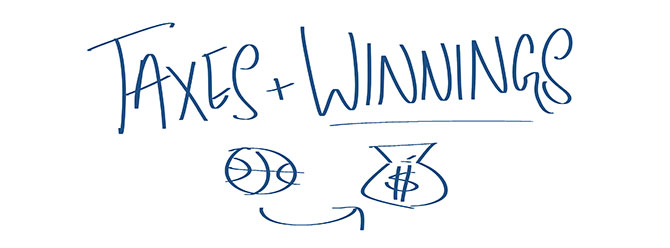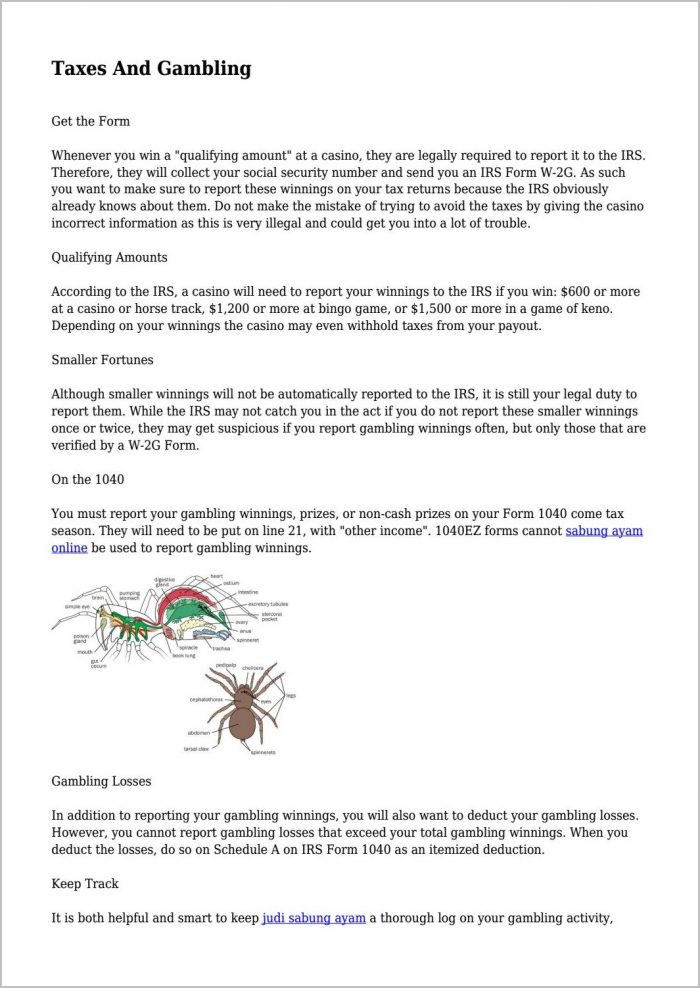Gambling Winnings On Form 1040
You can't deduct more in gambling losses than you have in gambling winnings for the year. For example, suppose you reported $13,000 in gambling winnings on Line 21 of Form 1040. Even if you lost. The full amount of your gambling winnings for the year must be reported on line 21 of IRS Form 1040. You may not use Form 1040A or 1040EZ This rule applies regardless of the amount and regardless of whether you receive a Form W-2G or any other reporting form. Gambling Losses up to the Amount of Gambling Winnings You must report the full amount of your gambling winnings for the year on Schedule 1 (Form 1040), line 21. You deduct your gambling losses for the year on Schedule A (Form 1040), line 16. You can't deduct gambling losses that are more than your winnings. You can't reduce your gambling winnings. Gambling winnings are reported as Other Income on Schedule 1 (Form 1040) Additional Income and Adjustments to Income, Line 8.While you may be able to deduct your gambling losses, gambling winnings are not directly offset by gambling losses in your tax return.
Inrecent times, the number of people who travel to gambling centers orregions where gambling is a lucrative business is on the high side.Reno and some cities of Las Vegas welcome several travelers for thispurpose.
Justso you know, if you win big while gambling, you do not get to keepevery cent to yourself. Now someone is asking, why? Well, gamblingwinnings are taxable! …it’s as simple as that!
So,just before you embark on any journey for the sole aim of gambling,take some lessons on tax laws relating to gambling and be sure tounderstand every piece of information you find therein just so youavoid the Internal Revenue Service (IRS) and its stress.
A little explanation of why gambling income is taxable.
Now,you’ll ask … “is gambling income taxable?” well, don’tstress it, the answer is not far- fetched!
Yes!Gambling income is taxable and just before the smiles on your facedisappears into thin air, there is good news for you as an earner…hang in there!

Unlikenormal income taxes, taxes placed on gambling are constant. That is,not progressive.
So,you have nothing to worry about. Be it winning a $3 million at thepoker table or $1500 at the slot machine. So, when you hit a big one,25% of your big win is to go to whichever game you play.
Plus,you will be provided with an IRS form which is also known as a W2-Gto enable you to report your earnings and winnings to the government.Keep in mind that this threshold depends on the type of game.
Anothersuitable question to ask is this, “do these games report theirgambling earnings? Definitely!
Aquick look at some examples; for specificity, in the casino, in orderfor your winnings to be reported, there is one inevitable thresholdthat should be declined.
Anotherexample is the slot machines; for winnings above $1200, it isrequired of you to report them.
Forthat of horse tracks, winnings that are greater than $600 or that are300 times your initial wager must be reported.
Thecase is not different for bingo as it is similar to the slot machine.Every winning from $1200 should be reported.
Thepoker tournament is no different as every winnings Greater than $5000must be reported.
Inspite of all these, it is not required of Casinos to hold taxes orissue a W2-G that was mentioned earlier in this article to playerswho win big amounts at some table games. For example, roulette,blackjack, craps.
Thereason for this kind of segregated requirement made by the IRS isunknown to us perhaps but known to them.
Froma well-observed point of view, in the table games, a level of skillis required whereas the slot machines are merely a game of chance.So, it is not expected of casinos to ascertain for sure the amountyou begin with when you cash in your chips from a table game.
Nowyou ask, “What happens when a W2-G is not sent to me or whathappens when I do not get a notification? Your question might also beasked in this form… What happens if my taxes are being withheldfrom blackjack winnings?
Beforeyou raise your hands high in the air while smiling thinking you canoutsmart all these, just a gentle reminder, not receiving a W2-G formor having withheld taxes does not relieve you of your duties toreport whatever is been won to the IRS.
Thenext question that should readily come to mind is “what should Ido in cases like this?” It’s simple! Do it yourself! You willsave yourself a whole lot of mess by filing your taxes alongside yourother taxes for the year rather than at the casino where you claimyour winnings.
Is Gambling Winnings Reported On A 1040 Form
Now,someone is saying, “oh! I’m a professional gambler, gambling iswhat I do for a living, mine is quite different, how do I report mytax?”
Where To Report Gambling Winnings On Form 1040
Ifgambling happens to be your real profession then, your revenue willbe tagged as regular earned income hence, it will be taxed at thenormal effective income tax rate of a taxpayer.
Gambling Winnings On Form 1040
Keepin mind that your income and expenses compulsorily must be recordedon Schedule C, if you are self-employed.
Hereis a poser. Ever wondered if individual states tax gambling winnings?Well, to answer the poser, certainly, they do.
Insome states, it is required of gambling winners to claim theirwinnings in the state where they were won irrespective of your placeof domicile. Also, your state of residence will require you to reportyour winnings but, at the same time give a deduction for the taxesthat have already been paid in the non- resident state.
Seemslike we are missing out on something really important which happensto be our big question for this article.
Everthought of what will happen if you do not report your gamblingwinnings? Well, enough of the rambles and mumbles as your eye-rollinghas confirmed the answer. Well, we know it’s a “No” simplybecause when that thought crossed your mind, you waved it off withthe back of your hands.
But,guess what? Dust your rackets as we will be hitting off some balls ofquestions as regards that.

Itis quite easy to shrug off the idea of reporting your gamblingearnings whenever that thought creeps into mind because we all wantto enjoy our bucks without any external force trying to snatch itfrom us.
Sosad! Now might not be a perfect time to let that slide as you do notwant to get involved with the IRS. Bet it could get messier thanimagined.
Aswe all know that the most difficult thing in the world to understand,as stated by Albert Einstein, is the concept of income taxes.
However,it is pertinent that you report the full amount of your gamblingwinnings as “other income” on line 21 of form 1040 asstated by the IRS. Also, you must distinctly claim your allowablegambling losses.
Reporting Gambling Winnings On 2017 Form 1040
Itis unknown to many that the IRS does not permit reducing or netting,gambling winnings by gambling losses and just reporting thedifference. Well, it is considered that such a person owes the IRSback taxes, interest and penalties.
Justso you know, gambling losses up to your winnings must be claimed asan itemized deduction on Schedule A, under the heading “othermiscellaneous deductions”. Where the problem lies is that asidesnetting, there are more than 65% of taxpayers who don’t itemize theirdeductions and can’t deduct gambling losses pay more tax on grosswinnings than they won.
Besides,losses accumulated from gambling cannot be moved forward tocounterbalance winnings in another year.
Incase you haven’t heard, the IRS takes a hard line on gambling income.Hence, in an audit, without providing enough documentation, the agentwill fail to believe you’re losing all winnings. That is, you musthave sufficient documentation to prove your loss so, keep your losingtickets alongside all other important documents you’ve got.
Whatwill a proper record-keeping require of you?

Aproper record-keeping will require a date, the type of gamblingactivity or wager, the name of the gambling establishment, theaddress of the gambling business and the number, list of peoplepresent with you plus the inevitable, amount won or lost.
Insome cases, it will be of utmost importance for you to keepsupplements hotel bills, gas cards, and airline tickets just to provethat they were not part of ATM gambling funds.
Sometimes,the IRS fails to take into consideration the credibility of the ATMreceipts forgetting that the ATM cash receipt could have been used topurchase the nondeductible like cinema bills, spa treatment, salon,restaurant meals.
So,we urge you to input all the ATM funds received to fund the gamblingsessions as evidence for your gambling records.
Keepin mind that the IRS kicks against the player’s reward card as it ismost times an ingenuine way to prove gambling loses because othergamblers have used the card.
Youridentity and evidence that you were the only one using the cardshould all be in your gambling records.
Yourgambling log is being supported and given credibility by document andwin-loss reports. So, put your journal to substantiate the player’scard at every gamble.
Inconclusion, we urge you to be careful just in case because manystatements do not provide substantiative evidence simply becauseestimates are being used. Also, do not hesitate to report every ofyour gambling winnings.
Cheers!
More Articles
If you had a successful night at the slots or poker tables, you're going to have to share some of the lucky proceeds with Uncle Sam. The Internal Revenue Service generally requires that you report your gambling winnings and losses separately when you file your taxes rather than combining the two amounts.
Record Keeping
As you gamble during the year, you need to keep records of your winnings and losses so that you can support whatever figures you report on your taxes. The IRS permits you to use per-session recording, which means that instead of recording whether you won or lost each time you pull the slot machine, you can simply record your total for the session. Your records should include the date and type of gambling, where you gambled and if you gambled with anyone else, such as a home poker game. If you win more than $600, you should receive a Form W-2G from the casino.
Taxable Winnings
When figuring your gambling winnings, only include the winnings from each session rather than using losses to offset your gains. You have to include gambling winnings even if you didn't receive a Form W-2G from the casino. For example, if you gambled six times during the year, winning $100, $3,000, $4,000 and $6,000 but losing $5,000 and $2,000, your gambling winnings for the year are $13,100. This amount gets reported on line 21 of your Form 1040 tax return.
Gambling Losses
To claim your gambling losses, you have to itemize your deductions. Gambling losses are a miscellaneous deduction, but -- unlike some other miscellaneous deductions -- you can deduct the entire loss. The deduction goes on line 28 of Schedule A and you have to note that the deduction is for gambling losses. For example, if you lost $5,000 on one occasion and $7,000 on another, your total deduction is $12,000.
Gambling Loss Limitation
You can't deduct more in gambling losses than you have in gambling winnings for the year. For example, suppose you reported $13,000 in gambling winnings on Line 21 of Form 1040. Even if you lost $100,000 that year, your gambling loss deduction is limited to $13,000. Worse, you aren't allowed to carry forward the excess, so if you had $87,000 in losses you couldn't deduct last year, you can't use that to offset the gambling income from the current year.
- tax forms image by Chad McDermott from Fotolia.com



